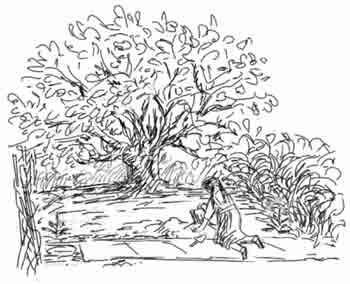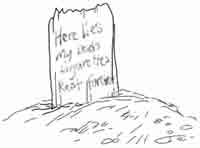Adapted from Choice Stories for Children
Jessica’s Graveyard
Jessica Andrews was a decided enemy of tobacco. She used to say she hated it. Now hate is a strong word, I know. My mother has often said to me, “My dear, you must hate nothing but sin”; and I never use the word without thinking of her advice. But I think, as Jessica did, that it is quite proper to say “hate” in speaking of tobacco, for it is a poison, and it injures more people than most folks are willing to believe. And then, it is so nasty! There, that is another word my mother never liked to hear me use. She said it isn’t a “pretty word.” I think it fits tobacco; and Jessica always thought so, too.
Jessica was a queer child. She never acted like other children, but had a way all her own, which sometimes made folks laugh, and sometimes cry, and always made them shake their heads, and say: “What an odd little girl Jessica Andrews is!”

She got the idea one day that she would have a little graveyard all her own. There was a part of the garden behind the house where nothing was planted. A long row of blackberry bushes hid it from sight, and she used to go down there to play. It was one day after she had been to the church cemetery for a neighbor’s funeral, that she got the idea of having the graveyard. She went straight off to the woods, and brought home four pretty little trees, which she planted in the four corners of the ground she had chosen. Thinking it would be best to get permission to use it, she went next to find her dad.
“Daddy! Daddy!” she called aloud, as he and several men were working in the machine shop. “Will you give me the northwest corner of the garden?”
“The what, child?”
“The northwest corner of the old garden. It is next to the old apple tree on the north side, with the walkway opposite, the cornfield on the west, and the blackberry bushes hide it from the house.” The men laughed at the conclusion of this speech, and Mother came out to see what was the matter.
“You don’t need to make fun of me,” exclaimed Jessica. “I tried to explain it carefully so you wouldn’t have to go see it.”
“Jessica wants me to deed her the northwest corn of the garden, Mother,” said Mr. Andrews. “Are you ready to sign the papers?”
“What do you want it for, my dear?” asked Mother. “Are you going to build a playhouse?” Her mother knew that it was Jessica’s favorite place to be. She was quite unprepared for the answer, and for the roar of laughter, which was repeated as the child looked up and replied:
“I want it for a graveyard, Mother.”
When Dad had recovered the power of speech, he asked, “What are you going to bury, dear?”
Quick as a flash of light, Jessica picked up her dad’s cigarette pack, which lay by the door. “This first,” said she, and off she ran.
So quick was her motion and the words that accompanied it, that no one saw what she had done. But when evening came, and Dad was ready for his evening smoke, the pack was missed.
“Where’s my cigarettes? Who has seen that new package of cigarettes I bought?” shouted Dad in a loud, angry voice.
“I buried them, Daddy, in my new graveyard,” said the child coolly. “Come and see.”
The heavy steps of the tired man and the light trip-trip of the little girl’s feet fell together on the garden walk as they set out for the northwest corner of the garden, where Jessica pointed to a neat little mound. At the head of it was placed a bit of shingle with the inscription:

“HERE LIES MY DAD’S CIGARETTES. REST FOREVER.”
The astonished man was at a loss for words. He didn’t know whether to laugh or be angry. Finally he concluded to do neither, but to try to get at the child’s meaning in all this. So, sitting down on an old cinder block, he took Jessica on his knees and began to question her. “Why did you bury them, dear?”
“Because, Daddy, I didn’t want you to die, as Mr. Thurston did. It’s a fact, Daddy,” she said hurriedly, seeing him start to smile. “I heard Dr. Bell say so when we were coming from the funeral. Miss Stevens asked him what was wrong with Mr. Thurston, and Dr. Bell said: ‘Those cigarettes, Miss Stevens. Chain smoker he was. He smoked himself out of this world and into—well, I can’t say exactly where he has gone. If folks get addicted to their cigarettes here, I don’t see what they’re going to do in the other. It seems to me they’ll want to keep up the smoking. I’m almost sure they can’t do it in heaven, for you know, Miss Stevens, heaven is a clean place and there is not going to be anything there that defiles.’ So, Daddy, I thought I’d dig a grave and bury that pack of cigarettes you bought. You won’t dig them up, will you?”
The man was silent for a few minutes. Then he said slowly, but firmly: “No, Jessica, your father is no grave robber. I shall miss my smoke; but I suppose I must say about it as we do about everything that’s put in the grave, ‘Thy will be done.’”
“That’s good,” said the child, with a kiss.
“Was that what you wanted this great graveyard for?” asked Dad, smiling again, and hoping to turn her thoughts to something else. “Was it only to bury those cigarettes?”
“No,” said Jessica earnestly. “I’m going to bury other things here, too. I expect I shall have a funeral almost every day. I’m going to bury Uncle Jim’s beer mug next.”
Dad looked surprised. “How will you get it?” Dad asked in surprise.
“Oh, I’ll get it! I’ll manage, Daddy. And Gary Smith smokes, too, and then there’s Ally’s fashion magazines and Margy’s novels. I do want to bury those soon!”
Jessica proved to be a busy little undertaker, and before the week had passed more than a dozen items had been buried in the new cemetery. The graves were all made evenly, side by side, exactly the same size, nicely rounded and marked. At the head of each was a tiny board on which she had written some inscription. These headboards had cost the girl much time and effort. On one was: “Jim Andrews’s Beer Mug. Drained out.” On another: “Cousin Alyssa’s Fashion Magazines. Lost to view.” On the next: “Margery Winter’s Romance novels. Closed forever.”
The northwest corner of the garden was finally full. More than sixty neat little graves were there in rows. The apple tree spread a friendly shade over the spot, and the blackberries ripened beside them; and many a visitor was taken slyly down the garden walk to see Jessica’s graveyard. But the best part was that for ever mound in that quiet spot, there stood a man or woman redeemed from an evil habit. Each bore testimony to the faithfulness and perseverance of a girl who loved purity and good health.